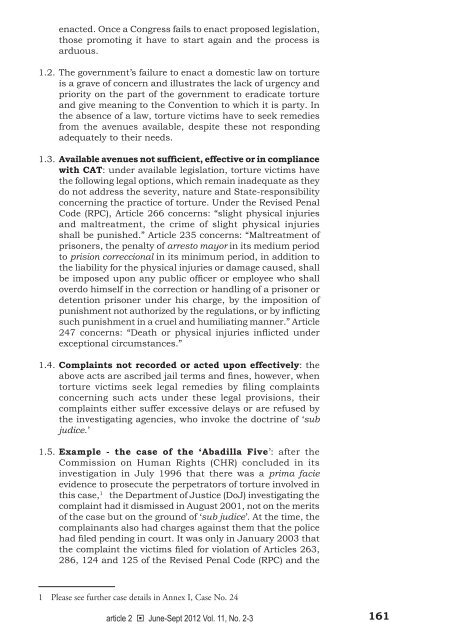Create successful ePaper yourself
Turn your PDF publications into a flip-book with our unique Google optimized e-Paper software.
enacted. Once a Congress fails to enact proposed legislation,<br />
those promoting it have to start again and the process is<br />
arduous.<br />
1.2. The government’s failure to enact a domestic law on torture<br />
is a grave of concern and illustrates the lack of urgency and<br />
priority on the part of the government to eradicate torture<br />
and give meaning to the Convention to which it is party. In<br />
the absence of a law, torture victims have to seek remedies<br />
from the avenues available, despite these not responding<br />
adequately to their needs.<br />
1.3. Available avenues not sufficient, effective or in compliance<br />
with CAT: under available legislation, torture victims have<br />
the following legal options, which remain inadequate as they<br />
do not address the severity, nature and State-responsibility<br />
concerning the practice of torture. under the Revised Penal<br />
Code (RPC), Article 266 concerns: “slight physical injuries<br />
and maltreatment, the crime of slight physical injuries<br />
shall be punished.” Article 235 concerns: “maltreatment of<br />
prisoners, the penalty of arresto mayor in its medium period<br />
to prision correccional in its minimum period, in addition to<br />
the liability for the physical injuries or damage caused, shall<br />
be imposed upon any public officer or employee who shall<br />
overdo himself in the correction or handling of a prisoner or<br />
detention prisoner under his charge, by the imposition of<br />
punishment not authorized by the regulations, or by inflicting<br />
such punishment in a cruel and humiliating manner.” Article<br />
247 concerns: “Death or physical injuries inflicted under<br />
exceptional circumstances.”<br />
1.4. Complaints not recorded or acted upon effectively: the<br />
above acts are ascribed jail terms and fines, however, when<br />
torture victims seek legal remedies by filing complaints<br />
concerning such acts under these legal provisions, their<br />
complaints either suffer excessive delays or are refused by<br />
the investigating agencies, who invoke the doctrine of ‘sub<br />
judice.’<br />
1.5. Example - the case of the ‘Abadilla Five’: after the<br />
Commission on human Rights (ChR) concluded in its<br />
investigation in July 1996 that there was a prima facie<br />
evidence to prosecute the perpetrators of torture involved in<br />
this case, 1 the Department of Justice (DoJ) investigating the<br />
complaint had it dismissed in August 2001, not on the merits<br />
of the case but on the ground of ‘sub judice’. At the time, the<br />
complainants also had charges against them that the police<br />
had filed pending in court. It was only in January 2003 that<br />
the complaint the victims filed for violation of Articles 263,<br />
286, 124 and 125 of the Revised Penal Code (RPC) and the<br />
1 Please see further case details in Annex I, Case No. 24<br />
article 2 � June-Sept 2012 Vol. 11, No. 2-3<br />
161


